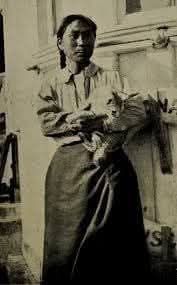In 1921, Ada Blackjack, an Iñupiat seamstress from Alaska, joined an expedition to Wrangel Island in the Russian Arctic. She wasn’t seeking adventure—she simply needed money to care for her sick son. Her task was modest: cook, sew, and interpret.
But when tragedy struck, Ada’s life changed in ways she could never have imagined. The four men on the expedition vanished while attempting to find help, leaving Ada and her cat, Vic, stranded on the desolate island, alone.
With no survival training, Ada had to learn quickly. Faced with relentless storms, hunger, and crushing isolation, she found the strength to adapt. She taught herself to hunt, set traps, prepare furs, and sew clothing to protect herself from the freezing cold. In her diary, she documented each day, a quiet act of resistance against the despair that surrounded her.
For two long years, Ada didn’t fight for fame—she fought for love. She survived because she had to return to her son.
When rescuers finally arrived in 1923, they found not a broken woman, but a resilient survivor—calm, strong, and unshaken. Ada Blackjack never called herself a hero, but history remembers her as one. She is a symbol of courage, a testament to the silent strength of Arctic’s indigenous peoples.
